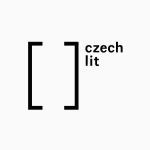On Wednesday 13th July, a group of young translators of Czech literature from all over the world met at an informal event in the Czech Centre in Prague. They were the winners of the third annual Susanna Roth Award, an international competition for beginner translators. Important figures on the Czech literary scene were also present, including journalists from the Právo newspaper and Czech Radio, the head of the Literary Section of the Arts and Theatre Institute, Viktor Debnár, and head of the Czech Centres Programme Department, Tatjana Langášková. Anna Bolavá, author of Into Darkness, an excerpt from which was chosen for translation by the competition committee, was also in attendance. Into Darkness is the story of a lonely, ill woman who has dedicated most of her life to collecting, drying and providing medicinal plants. Despite the slow, seemingly dispassionate pace, a strange unease bubbles under the surface of this novel which won the 2016 Magnesia Litera Award for prose.
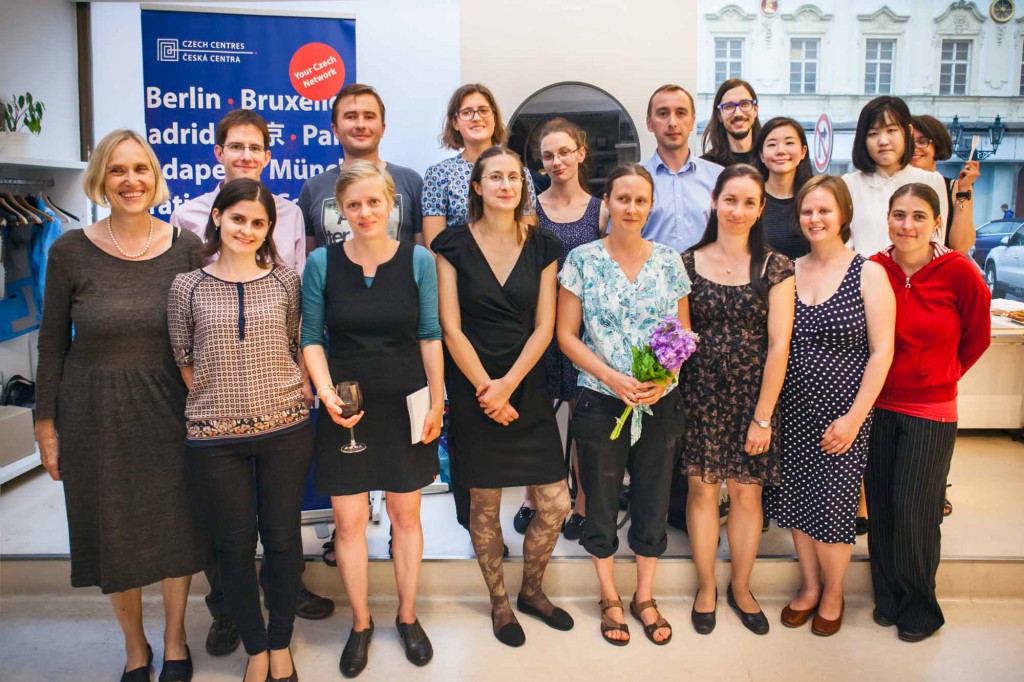
The winners, author and organisers in the Czech Centre. Photo: Anna Pleslova.
The translators welcomed the opportunity to meet their international colleagues as well as the author, who until then they had known only from her book. The winners were: Desislava Vilimovská (Bulgaria), Tena Šinjori (Croatia), Mei Kashima (Japan), Park Su Hyun (South Korea), Anna Steinbachné Bobok (Hungary), Katharina Hinderer (Germany), Agata Wróbel (Poland), Claudia Marek (Austria), Maria Cristea (Romania), Alexey Artyuchin (Russia), Ludmila Smoljar and Oleksandra Stukalo (Ukraine) and Paddy Phillips (Great Britain) whose translation can be read in full here. More information in Czech about the winners can be found here.
Early the next morning, Paddy Phillips and Mei Kashima were interviewed by Czech Television, after which they joined the other winners in the Arts and Theatre Institute in Prague for a translation workshop.
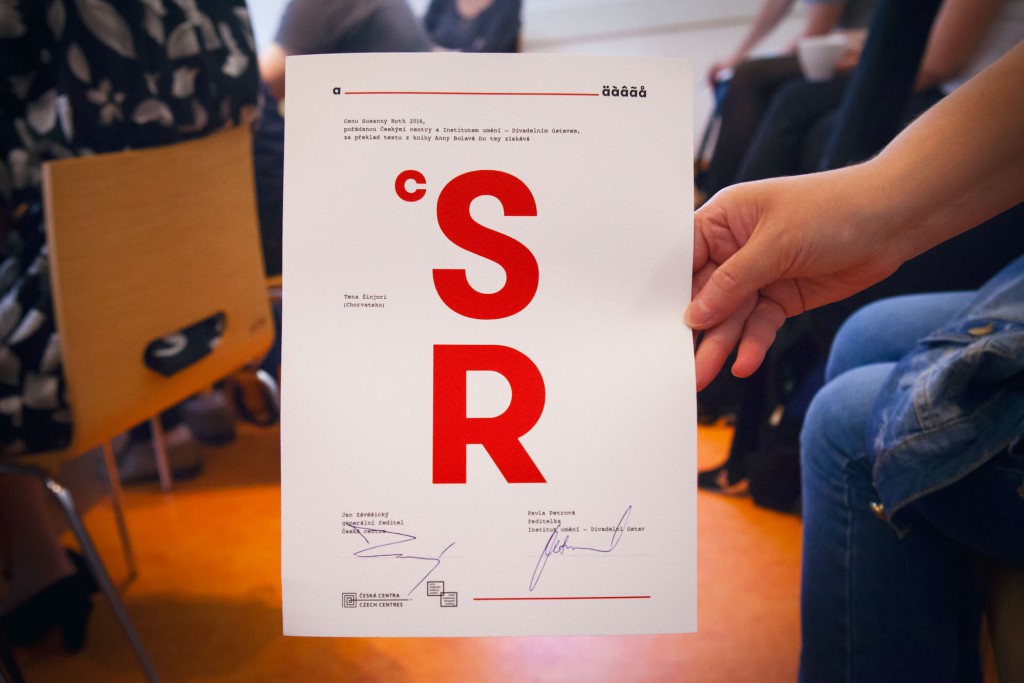
The diplomas presented to the winning translators at the workshop in Prague. Photo: Anna Pleslova.
The first speaker was Viktor Debnár who introduced the activities of the Literary Section of the Arts and Theatre Institute, including the CzechLit website which promotes Czech literature abroad and aims to help translators navigate the complex Czech literary scene. Debnár also discussed residencies offered by the International Visegrád Fund, the history and future of the Susanna Roth Award as well as the series of European Literature Nights held in Prague.
Radim Kopáč from the Literature and Libraries Division of the Ministry of Culture then talked about the Ministry’s translation grant programme. This year the programme has allocated over €220,000 to support 135 translations, which is a record number representing approximately two thirds of all translations of Czech literature published in 2016. Kopáč also mentioned that winning the Susanna Roth Award is seen by the grant committee as a significant plus when evaluating applications.
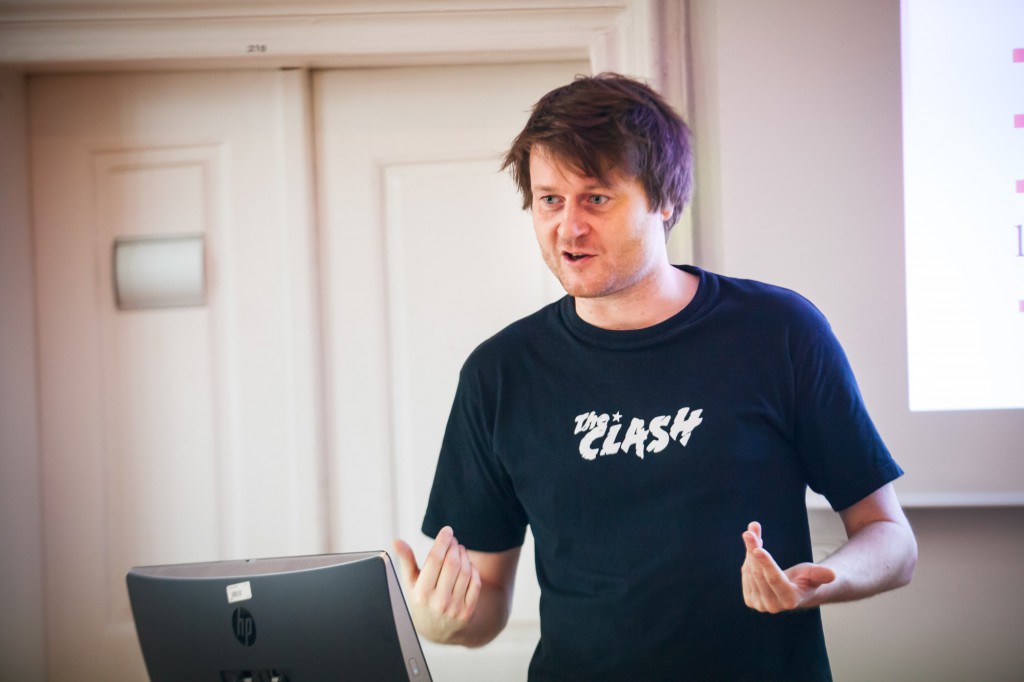
Radim Kopáč. Photo: Anna Pleslova.
Petr Janyška, director of the Czech Centre in Warsaw, talked about Czech literature and Czech studies in Poland, where an unprecedented number of young translators, 40, took part in the competition. Janyška had a lot of good news from Poland: the publisher Książkowe Klimaty has already decided to publish Anna Bolavá’s Into Darkness and is currently looking for the right translator. There has always been significant interest in Czech literature in Poland, where it is seen to be of high literary value while also being popular with readers. For example, during just one weekend at the Warsaw Book Fair, 500 copies of the recently translated National Avenue (Národní třída) by Jaroslav Rudiš were sold and children’s books, such as the Oddgluttons (Lichožrouti) series, are also gaining in popularity. As for Czech Studies in Poland, it attracts over 500 students annually. Although this bodes well for the future, Janyška emphasised the need for a new generation of translators and more support for translators after they complete their studies. This is one reason why initiatives like the Susanna Roth Award are so important. Janyška suggested that similar events should take place more often and should be followed by a workshop for the participants where established translators would assist and provide feedback to their younger colleagues. One such workshop was organised this year for the Polish participants in the competition.
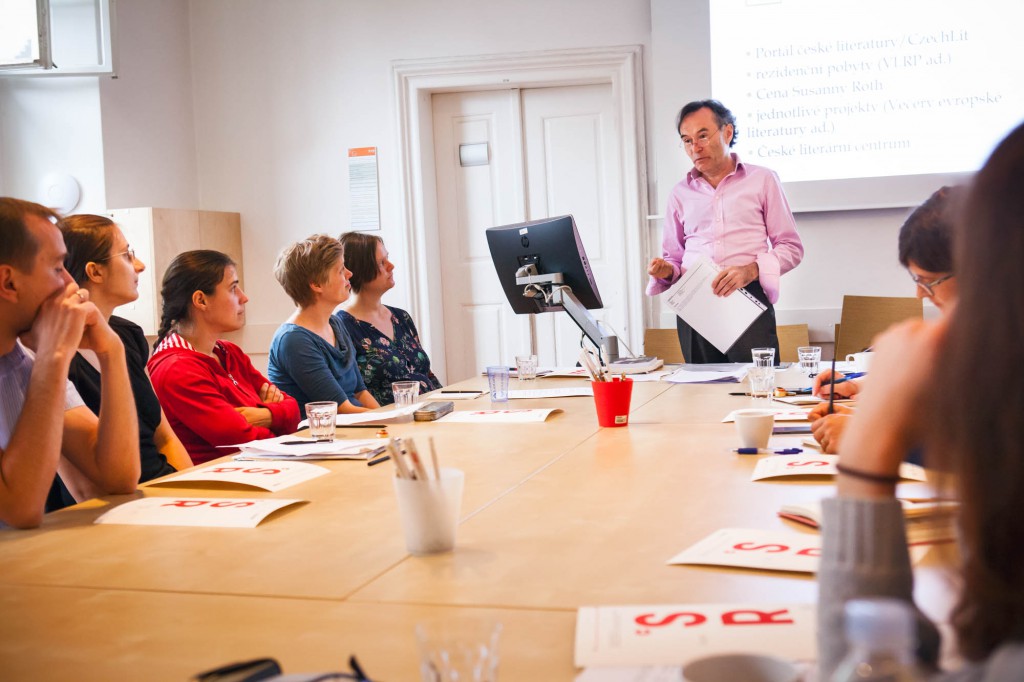
Petr Janyška. Photo: Anna Pleslova.
After Janyška’s presentation, German translator Doris Kouba took the floor. She had a number of practical tips for the beginner translators, especially about how to successfully pitch a book to a publisher. She stressed that the key is a flawless synopsis presenting the author as an important voice of their country or generation. Likewise it is necessary to choose an appropriate publisher for the given translation. Kouba also mentioned the practice of pitches, i.e. events where translators have little more than one sentence to “sell” their book to potential publishers. In her opinion although this is often demeaning for the translator they must be prepared for it. Kouba further stressed that translators should be involved in the whole publishing process up until the book is printed — they should oversee the editing and approve the final text. She also urged the young translators to take advantage of every option available to them, including grants, scholarships and residencies. Doris Kouba is a firm believer that translation is hard but rewarding work which must be appropriately remunerated and it is up to the translators themselves to push for better conditions. For example, efforts in Germany led to a court decision which set a minimum pay of €20 per translated page.
Following the workshop, the participants took a train to Brno in time for the first evening of the annual Bohemistics Seminar. During the 5-day event, the translators attended author readings, a series of lectures by Czech publishers, translators and academics and also had the opportunity to visit many Moravian towns and landmarks.
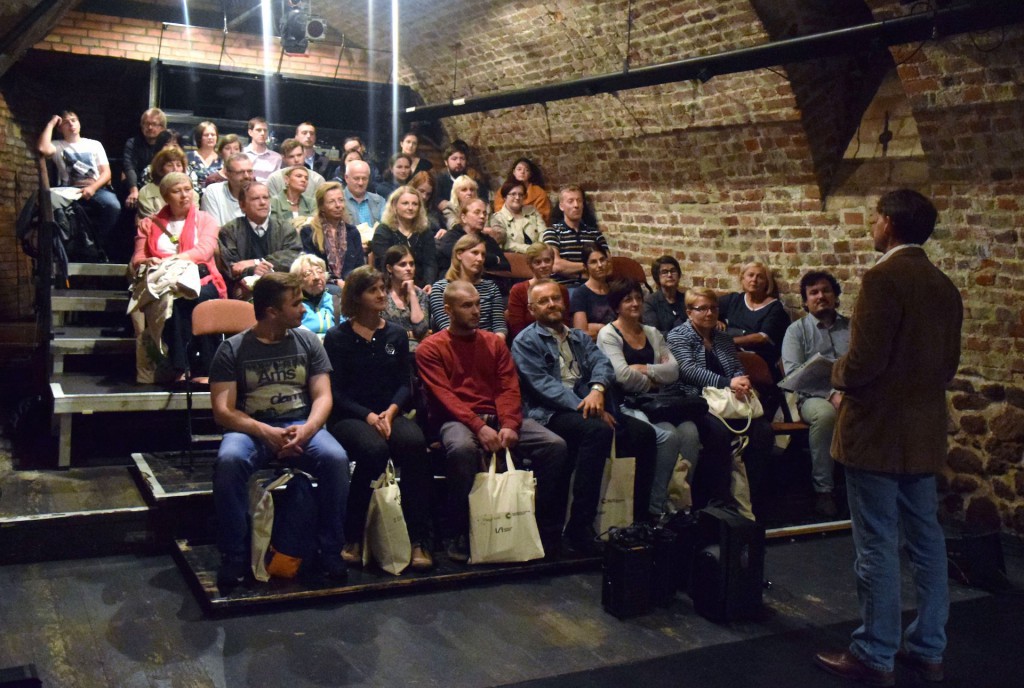
Translators at the Bohemistics Seminar in Brno. Photo: Soňa Šinclová.
The competition’s history
Viktor Debnár initially came up with the idea of organising a competition for beginner translators of Czech literature in 2013. The aim of the competition from the outset was to support young translators as well as to help Czech authors reach an international audience. The award, named after renowned Swiss translator, Susanna Roth (1950–1997), who contributed significantly to the promotion of contemporary Czech literature abroad, is organised by the Literary Section of the Arts and Theatre Institute and Czech Centres. It is for translators up to 40 years of age, whose task is to translate a piece of contemporary Czech prose written by an author of a similar age. Contestants must be citizens or permanent residents in one of the participating countries and cannot have published a book translation in the language of the given country. The winners are chosen by a jury of translators and academics in each participating country.
When the competition was first held in 2014, the rules outlined above had still not been firmly established. The organisers had not set an age-limit for the author of the original text and instead chose to take advantage of the centenary of Bohumil Hrabal’s birth. Thus the participants translated one of Hrabal’s never-translated short stories or an extract from a longer prose piece. For instance, the text selected for Great Britain was the short story Polomy v lese. 138 translators from 12 countries took part in the competition.
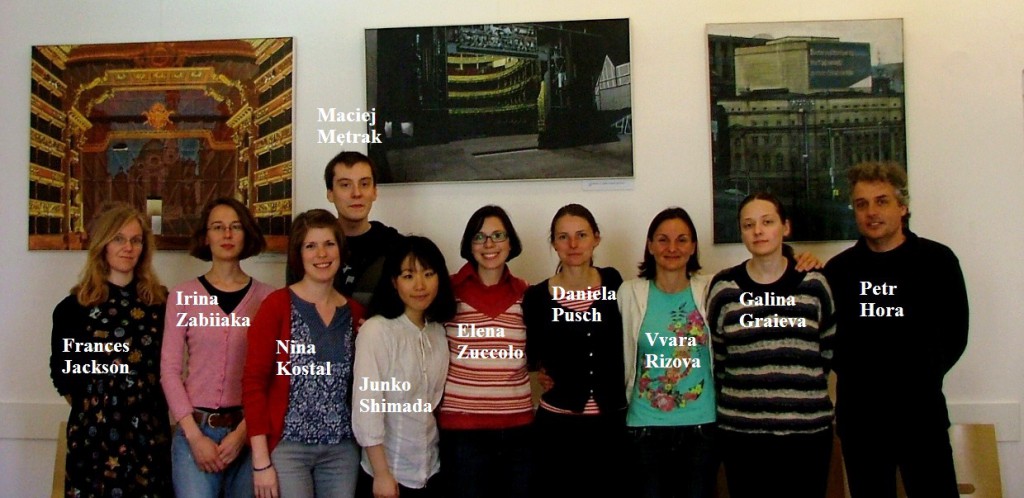
2014 competition winners, not pictured: Svetlana Rohach and Montserrat Tutusaus Romeu. Photo: Jaroslav Balvín.
The 12 winners were rewarded with a stay in Prague during which they took part in an intensive programme focussing on Hrabal and Czech literature in general − they met Hrabal’s friend and expert on his work, Tomáš Mazal, traced Hrabal’s footsteps in the Libeň district with Lenka Mandová from the Prague Information Service, attended Literature Night and the Book World Prague international book fair where they met respected Czech Studies specialists and also took part in lectures and discussions at the Institute of Czech Literature. The winner from Great Britain, Frances Jackson, explained “I wanted to take part in the competition because of my professor at Oxford, Dr. James Naughton, who died this year in February. He translated Hrabal in Great Britain. Without him I wouldn’t know Czech and so I wanted to do something for him, as I wasn’t able to attend his funeral”.
For the next competition in 2015, an expert committee selected David Jan Žák’s The Return of the King of Šumava (Návrat krále Šumavy), a biographical novel about Josef Hasil, who smuggled people across the Czechoslovak border to the west under the Communist regime. 91 translators from 13 countries, including Egypt, Russia and Finland entered the competition. The winner from Hungary, Zsuzsanně Juhászné Hahn, has since had two translations published — Petra Soukupová’s To Disappear (Zmizet) and Dora Kaprálová’s A Winter Book about Love (Zimní kniha o lásce) — and is currently working on Jan Němec’s EU Prize for Literature-winning A History of Light (Dějiny světla).
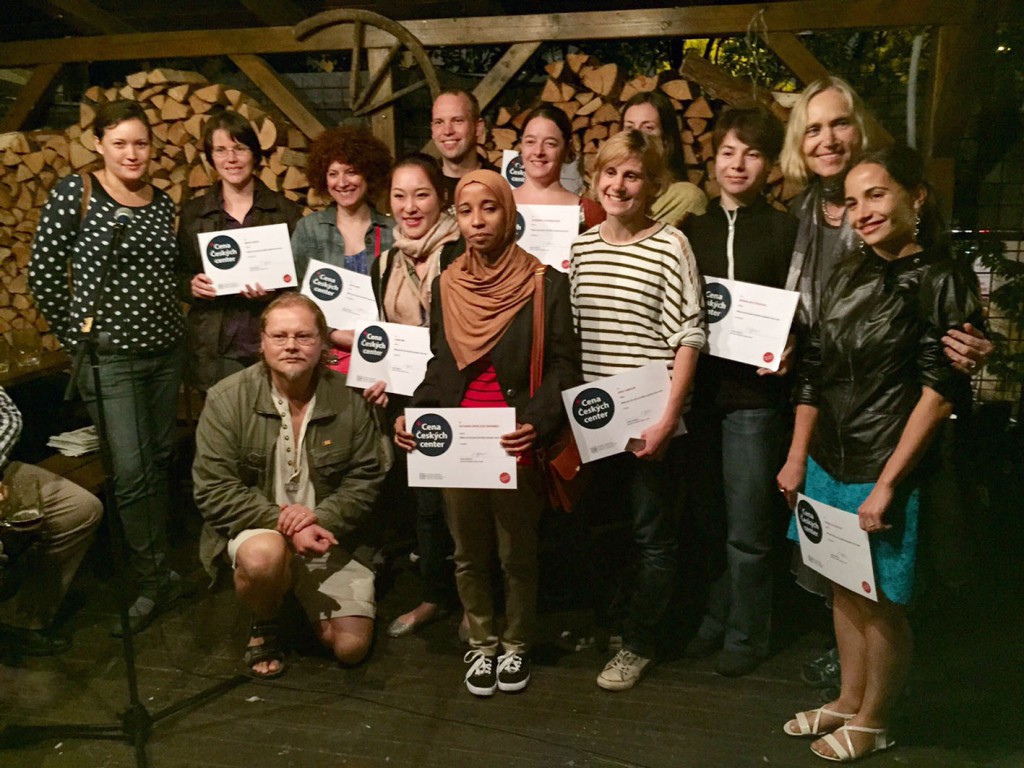
Author David Jan Žák and the winners of the competition in 2015.
The future
Preparations for next year’s award are in full swing and the organisers are currently deciding which book to set as well as how to improve the competition in the future. There are a number of avenues to pursue, including holding it more than once a year, improving the award’s connection with international publishers and providing more feedback to participants. At CzechLit we’re already looking forward to next year’s competition!
Cover image: Susanna Roth and Bohumil Hrabal. Photo: Daniel Roth.
[ ]
